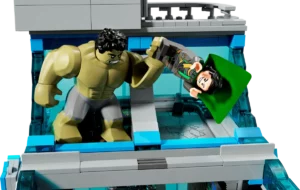My favourite book of all time has hit the screen twice. The first attempt was a fumbled feature film from the early 1960s which, despite the liberties it plays with John Wyndham? original novel, is still reasonably entertaining despite the outrageous padding and concessions to a Hollywood audience. The second – and best – attempt is finally out on DVD and it? in the shape of this well-remembered six-part 1981 adaptation courtesy of the BBC who, you may be surprised to learn, actually used to make mid-week dramas like this instead of padding their weeknight schedule with shows about airports, bailiffs and drainage inspectors. Grrrrr?n
The novel is a dense, enthralling book and Douglas Livingstone? skilful adaptation retains the flavour or the original whilst updating the source material and cutting away some of the dated 1950s flab. The first episodes sees hero Bill Masen still bandaged up in hospital still recovering for the after-effects of a nasty lashing from a triffid sting – triffids being the curious carnivorous mobile plants which suddenly appeared all over the earth a few years previously. Bill? eye injury has meant that he? missed the spectacular night-time fireworks as the world became bathed in some sort of cosmic radiation or, perhaps, passed through a colourful meteorite storm. When no-one comes along in the morning to remove his bandages Bill does it himself – and finds not only that his eyesight hasn? been damaged but also that those around him have lost theirs. He ventures out of the hospital to find a desolate, silent London, the only sounds the wails of the desperate and the click-click of walking sticks. Bill soon meets up with fellow sighted survivor Jo (Relph) – re-invented here from the outrageous good-time socialite of the novel into, well, a rather well-to-do young 1980s woman in yellow dungarees – and they fall in with an organised group at a nearby barracks. Despite the best efforts of the well-meaning Coker (Colbourne) the blind are being kept at bay to preserve resources as the new group prepares to move out of a London which is likely to become uninhabitable before long. During the night the barracks come under attack and some of the sighted are kidnapped and forced to look after groups of the disenfranchised blind. Bill and Jo are separated and when, after a few days, the situation deteriorates and a mysterious disease starts to kill off the blind, Bill determines to find Jo?espite the presence of the hostile triffids which are loose on the streets and hungry for human flesh.
DAY OF THE TRIFFIDS has aged well. Its reliance on character over spectacle is its greatest strength. The triffids are used sparingly but their appearances are devastating and still terrifying. The strengths of the book have survived the journey into television and the ghastly scale of the disaster is told as well as shown – told l through keenly-honed dialogue and shown courtesy of some shock images; a dead body being coldly feasted upon by a triffid in the countryside, bodies sprawling on roads and bridges, an image of London covered in moss and grass a few years after the disaster. The triffids themselves may look clumsy and slow-moving by today? standards but they still have an eerie, unsettling power as they rattle their way through the story and lash out with their deadly poisonous stingers. Brrrrr? The six episodes are well-paced and packed with incident and if there? any criticisms it? with the casting. Duttine is good as Masen but seems to lack the power and charisma of the man depicted in the novel. Relph does her best with not much material for Jo and the much-missed Maurice Colbourne is grittily believable as the pragmatic Coker.
DAY OF THE TRIFFIDS is the best of the BBC? new slew of archive SF releases and whether you?e a fan of the book or just of good TV drama, you really need it in your collection.
THE DISC: Very good transfer for a twenty-five year old TV series with good colour separation and no real grain. No extras, sadly, but an extensive booklet detailing the production of the series.
]]>



